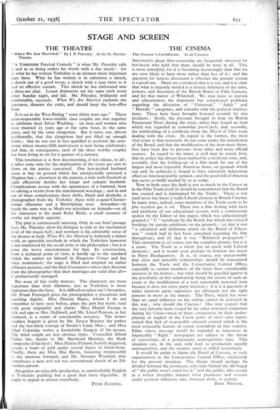STAGE AND SCREEN
THE THEATRE
" A YORKSHIRE Farcical Comedy " is what Mr. Priestley calls it and in so doing orders his words with a due nicety : for in what he has written Yorkshire is an element more important than farce. What he has written is in substance a sketch, a sketch out of a good revue, a sketch with a neat twist to it and an effective curtain. This sketch he has elaborated into a three-act play. Lesser dramatists try the same trick every other Sunday night, and fail. Mr. Priestley, brilliantly and comfortably, succeeds. When We Are Married enchants the spectator, disarms the critic, and should keep the box-office busy.
It is set in the West Riding " some thirty years ago." Three ultra-respectable lower-middle class couples are met together to celebrate their Silver Wedding : six men and women who were married 25 years ago at the same hour, in the same place, and by the same clergyman. But it turns out, almost accidentally, that this clergyman had not filled up enough forms ; that he was not in fact qualified to perform the cere- mony whose twenty-fifth anniversary is now being celebrated ; and that, in consequence, each of the three worthy couples has been living in sin for a quarter of a century.
This revelation is at first disconcerting, if not odious, to all ; it takes some time for the implications of the status quo ante to dawn on the parties concerned. One hen-pecked husband turns at bay on gro.und which has unexpectedly sprouted a Maginot line ; elsewhere in the pattern, a wife with freedom in sight effectively derides her stingy and sultanic husband. Complications accrue with the appearance of a barmaid, bent on salving a victim from the matrimonial wreckage ; and in and out of these complications there drifts, bland and alcoholic, a photographer from the Yorkshire Argus with a quasi-Chester-, tonian silhouette and a Bardolphian nose. Attendant—in much the same way as Moth was attendant on Armado—on all the characters is the maid Ruby Birtle, a small creature of earthy yet impish sagacity.
The play is continuously amusing. Only in one brief passage does Mr. Priestley allow his dialogue to sink to the mechanical level of the music-hall ; and nowhere is his admirable sense of the theatre at fanit. When We Are Married is definitely a minor work, an agreeable interlude in which the Yorkshire humorist is not reinforced by the social critic or the philosopher ; but it is none the worse entertainment for that. Its construction, from a technical point of view, is hardly up to the standard which the author set himself in Dangerous Corner and has since maintained ; the stage is filled and• emptied on rather arbitrary pretexts, and the final denouement—when they discover from the photographer that their marriages are valid after all— is perfunctorily managed.
But none of this really matters. The characters are more important than their dilemma, just as Yorkshire is more important than the farce. It is difficult to select one's favourites. Mr. Frank Pettingell gives the photographer a precarious and touching dignity. Miss Patricia Hayes, whom I do not remember to have seen before, plays the pert but rustic maid with great originality and charm. Miss Muriel George is rich and ripe as Mrs. Helliwell, and Mr. Lloyd Pearson, as her husband, is a comic of considerable resource. The down- trodden Soppitt is given by Mr. Ernest Butcher the pathos and the last-tlitch courage of Strube's Little Man ; and Miss Ethel Coleridge makes a formidable Gorgon of his spouse. The third couple are lesS obvious types. Councillor. Albert Parker has, thanks to Mr. Raymond Huntley, the bleak pomposity of his kind ; Miss Helena Pickard, heavily disguiied, reveals -a heart of gold under several layers of whale-bone. Finally, there are Miss Mai Bacon, bouncing -irrepressibly as the amorous barmaid, and Mr. Norman WooLand, who contributes a neat and not too conventional sketch of an Ed- wardian parson.
Altogether an enjoyable production, as unmistakably English as Yorkshire pudding but a good deal more digestible. It ought to appeal to almost everybody.
PETER PLEIslING.















































 Previous page
Previous page